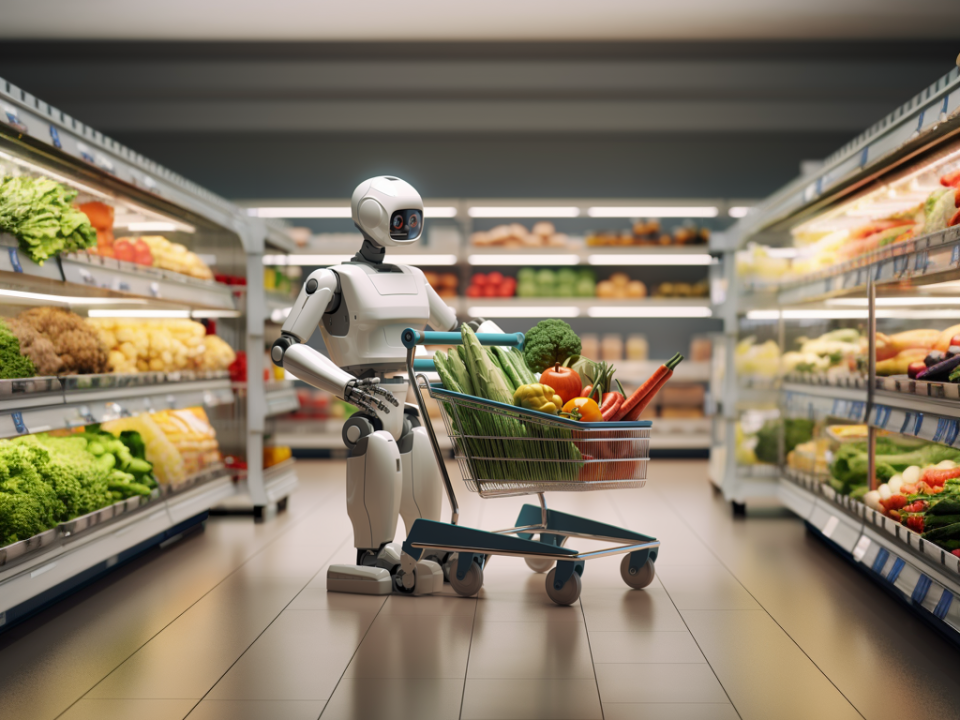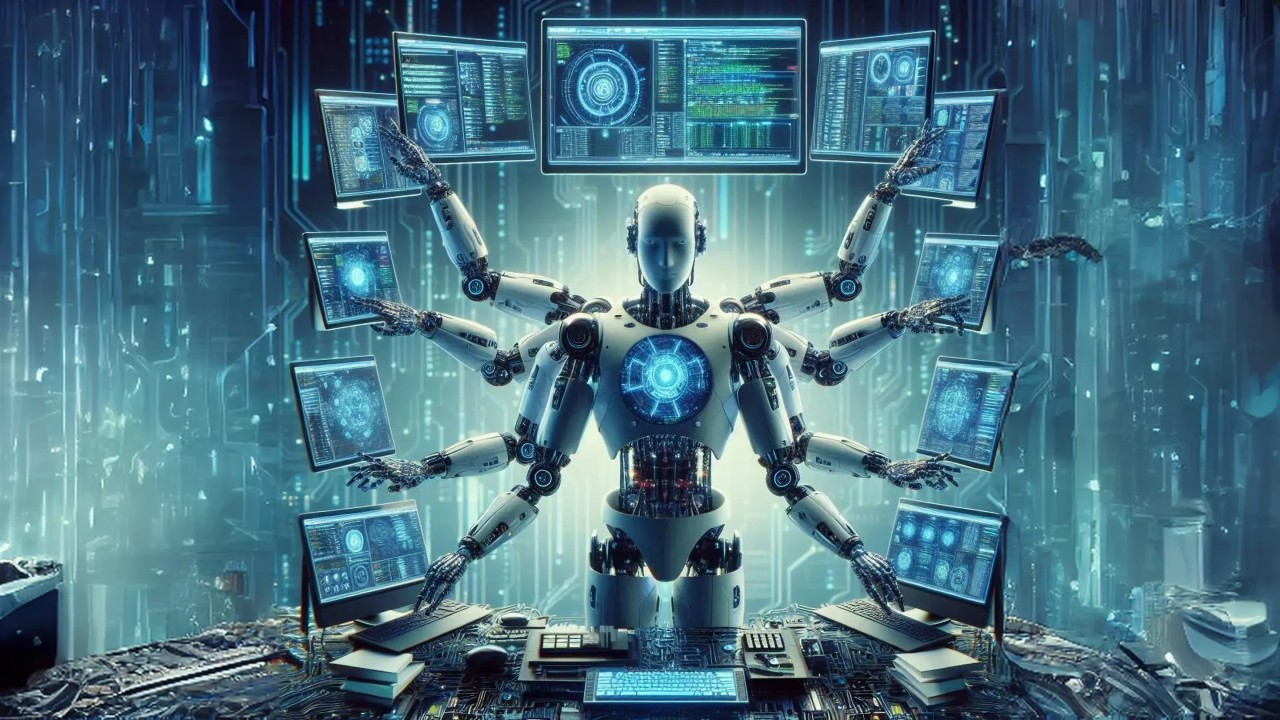Artificial intelligence (AI) is transforming grocery shopping, optimizing your list from fridge to doorstep. Imagine a system that remembers your favorite brands, suggests recipes based on what you have, and even predicts when you'll need a refill. AI can do this and more, streamlining your grocery experience, minimizing food waste, and ensuring you always have the ingredients on hand for a delicious and healthy meal.
AI-powered Food Waste Reduction: A Grocery Shopping Revolution
Imagine a grocery shopping experience where food waste is a relic of the past. Artificial intelligence (AI) is poised to revolutionize the way we shop and dramatically reduce the staggering amount of food that gets thrown away each year. This isn't just science fiction; AI-powered solutions are already making waves in the grocery industry, promising a win-win for consumers, retailers, and the environment.
Smarter Inventory Management: By analyzing past sales data, weather patterns, and even local events, AI can help stores predict demand with pinpoint accuracy. This means less overstocking of perishables, leading to fewer markdowns and ultimately less food ending up in landfills.
Dynamic Pricing with a Purpose: AI can optimize pricing strategies in real-time. As items approach their sell-by dates, prices can automatically be reduced, incentivizing customers to grab these deals and prevent them from spoiling.
Personalized Shopping Assistant: Imagine a virtual assistant in your shopping cart, powered by AI. It can analyze your past purchases, suggest recipes based on what's on sale, and even create optimized shopping lists to minimize food waste at home.
Food Rescue Gets a Boost: AI can connect grocery stores with food banks and charities, streamlining the process of donating surplus food nearing its expiration date. This ensures perfectly good food reaches those in need instead of being discarded.
Cost Savings for Everyone: Reduced waste translates to lower prices for consumers and increased profitability for stores.
Fresher Food on Shelves: With more accurate demand forecasting, stores can stock shelves with fresher products, leading to a better overall shopping experience.
Sustainable Food Systems: By minimizing food waste, AI contributes to a more sustainable food system, reducing environmental impact and ensuring food security for future generations.
The future of grocery shopping is brimming with intelligent solutions powered by AI. This technology has the potential to not only change the way we shop but also make a significant impact on the global food waste crisis. As AI continues to evolve, we can expect even more innovative solutions that make grocery shopping smarter, more efficient, and kinder to our planet.
The Algorithmic Kitchen: AI Recipe Recommendations and Personalized Meal Planning
The Algorithmic Kitchen: AI Recipe Recommendations and Personalized Meal Planning is an exciting concept that utilizes artificial intelligence (AI) to revolutionize the way we approach food and cooking.
Understanding Your Tastes: AI algorithms can learn your preferences by analyzing your past recipe interactions, dietary restrictions, and even social media activity. This allows the system to recommend recipes that align perfectly with your palate, from adventurous spice combinations to comforting classics.
Dietary Tailoring: Do you have allergies, follow a specific diet (vegan, paleo, etc.), or have certain nutritional goals? AI can factor in these considerations to suggest recipes that fit your needs. Imagine having a virtual recipe assistant that curates a list of delicious and healthy meal options that are perfect for you.
Beyond the Obvious: AI can go beyond simply suggesting similar recipes. It can analyze recipe data to identify interesting flavor profiles, ingredients, or cooking techniques you might enjoy and present unexpected yet delightful recommendations that expand your culinary horizons.
Goodbye Mealtime Dilemmas: No more staring blankly at the fridge, wondering what to cook. AI can create personalized meal plans based on your preferences, dietary needs, and even what ingredients you already have on hand. This eliminates mealtime stress and helps you avoid food waste.
Cooking Efficiency: Imagine an AI that can plan your meals for the week, considering prep time, cooking times, and even suggesting recipes that share ingredients to streamline your cooking process. This can save you valuable time in the kitchen.
Grocery List Optimization: The AI can generate a consolidated grocery list based on your meal plan, eliminating unnecessary purchases and impulse buys. This translates to cost savings and less food spoilage.
The Algorithmic Kitchen has the potential to transform our relationship with food. By leveraging AI, we can cook smarter, not harder, explore new flavors with confidence, and ultimately, enjoy a more delicious and sustainable approach to home cooking.
From Smart Fridges to Autonomous Deliveries: The Future of Grocery Shopping
The way we buy groceries is on the cusp of a major transformation. Gone are the days of endless lists, impulse buys, and forgetting essential items. The future of grocery shopping is brimming with intelligent technology, promising a more convenient, personalized, and sustainable experience.
Inventory Management at Your Fingertips: Smart fridges, equipped with cameras and sensors, can track your inventory in real-time. Running low on milk? No problem, the fridge can automatically add it to your grocery list. This eliminates the need for mental notes and frantic last-minute store runs.
Personalized Recommendations: By learning your preferences and analyzing past purchases, your smart fridge can suggest recipes based on what you have on hand, preventing food waste and sparking culinary creativity.
Smart Replenishment: Imagine a fridge that seamlessly reorders groceries when you're running low. Some smart fridges can integrate with online grocery stores, placing automatic orders for essentials based on pre-set preferences.
Voice-Activated Shopping: Imagine placing your grocery order by simply talking to your smart speaker. These systems can integrate with your grocery list and even suggest substitutions for out-of-stock items.
Ultra-Fast Delivery Options: Drone delivery is no longer science fiction. Companies are exploring the use of drones to deliver groceries directly to your doorstep, potentially within minutes of placing your order.
Autonomous Delivery Vehicles: Self-driving cars and delivery robots are poised to revolutionize the delivery landscape. Imagine a self-driving vehicle pulling up to your house with your groceries, eliminating the need to be home for a delivery.
Subscription Boxes Tailored to You: Imagine receiving a curated box of groceries every week, filled with fresh produce, healthy snacks, and delicious meal options based on your dietary needs and preferences.
Minimizing Food Waste: Technology can play a crucial role in reducing food waste. AI-powered inventory management systems can optimize ordering for both stores and consumers, and smart packaging can extend the shelf life of fresh produce.
The future of grocery shopping is a blend of convenience, customization, and sustainability. With intelligent technology paving the way, we can expect a future where grocery shopping becomes a seamless and enjoyable experience that benefits not just our wallets but also the environment.
The Grocery Shopping Divide: AI and Accessibility in the Digital Age
The digital revolution is transforming the way we shop for groceries. Artificial intelligence (AI) promises a future of personalized recommendations, optimized shopping lists, and even autonomous deliveries. While these advancements offer undeniable convenience and efficiency, a crucial question emerges:
Digital Literacy Gap: Not everyone has access to the internet or the digital literacy skills required to navigate online grocery platforms or utilize AI-powered features. This could leave seniors, low-income communities, and individuals in rural areas struggling to participate in the digital grocery revolution.
Affordability Concerns: While AI might optimize shopping experiences, it's important to ensure these advancements don't widen the affordability gap. Subscription boxes or personalized recommendations could inadvertently steer users towards premium or niche products, putting a strain on budgets.
The Human Touch: There's a certain value to the traditional in-person grocery shopping experience. The ability to assess the quality of produce, interact with a friendly butcher, or seek personalized recommendations from a familiar store employee could be lost in a purely digital world.
Prioritizing Accessibility: Design that prioritizes user-friendly interfaces, multilingual support, and offline functionality can help bridge the digital literacy gap. Additionally, exploring voice-activated interfaces or text-based alternatives can be inclusive for people with visual impairments.
Focus on Value, not Just Convenience: AI can be used to identify deals and recommend cost-effective options, ensuring everyone has access to healthy and affordable groceries. Highlighting generic store brands or budget-friendly meal plans can be powerful tools for promoting affordability.
Human-AI Collaboration: The ideal future integrates AI with the human touch. Imagine AI-powered kiosks in stores that assist with product selection or digital signage with personalized recipe recommendations alongside friendly staff available to answer questions and provide a human connection.
The future of grocery shopping powered by AI has immense potential. By prioritizing accessibility, affordability, and human-AI collaboration, we can ensure this digital revolution benefits everyone, not just those who are already digitally connected.
The Ethics of Algorithmic Grocery Shopping: Privacy, Transparency, and Bias
As AI transforms grocery shopping, a critical conversation around ethics emerges. While personalized recommendations and optimized shopping experiences offer undeniable benefits, it's essential to ensure these algorithms operate ethically and responsibly.
Data Collection and Usage: Grocery shopping involves a wealth of personal data, from purchase history to dietary preferences. Clear and transparent data collection policies are crucial. Consumers should have control over what data is collected, how it's used, and with whom it's shared.
Targeted Advertising: AI can be used for targeted advertising within grocery platforms or recipe recommendations. While some level of personalization is expected, intrusive advertising tactics or manipulation of purchasing decisions raise ethical concerns.
Algorithmic Bias: AI algorithms are only as good as the data they're trained on. Biases in data sets can lead to discriminatory recommendations. For example, an algorithm might suggest healthier options to wealthier users or promote certain ethnic cuisines less frequently. Transparency in how algorithms work and efforts to mitigate bias are essential.
Explainability of Recommendations: Consumers deserve to understand why an AI system recommends a particular product or recipe. Transparency into the reasoning behind recommendations fosters trust and empowers users to make informed choices.
Strong Privacy Regulations: Clear regulations should govern data collection, usage, and user consent within the grocery shopping ecosystem. Consumers should have the right to access and control their personal data.
Focus on Fairness and Equity: AI algorithms need to be rigorously tested for bias and continuously monitored to ensure fair and equitable treatment for all users, regardless of background or socioeconomic status.
User Education and Empowerment: Educating consumers about how AI shapes their grocery shopping experience is crucial. Understanding the algorithms and having control over data settings empowers users to make informed choices.
Conclusion:
The future of grocery shopping is brimming with convenience and personalization thanks to AI. From intelligent refrigerators that track expiring items to apps predicting your next recipe and suggesting ingredients, AI streamlines your grocery list. You can expect to save time and money with optimized deliveries, reduced food waste, and even personalized deals on your favorite products. AI is poised to transform your grocery experience, taking it from a chore to a breeze.
Read more here : https://mindnotix.com/blogs/revolutionizing-groceries-how-ai-is-streamlining-your-deliveries
https://www.mindnotix.com/blogs/the-future-of-food-delivery-ai-powering-a-smarter-kitchen
For more information contact : support@mindnotix.com
Mindnotix Software Development Company


 AI-Taxi App
AI-Taxi App AI-Food App
AI-Food App AI-Property Mgmt App
AI-Property Mgmt App AI-CRM
AI-CRM AI-Fantasy App
AI-Fantasy App
 Web Development
Web Development App Development
App Development Business & Startup
Business & Startup Hire Developer
Hire Developer
 Digital Marketing
Digital Marketing Lead-generation
Lead-generation Creative Agency
Creative Agency Branding Agency
Branding Agency Augmented Reality
Augmented Reality Virtual Reality
Virtual Reality Internet of Things
Internet of Things Artificial Intelligence
Artificial Intelligence Blockchain
Blockchain Chatbot
Chatbot



